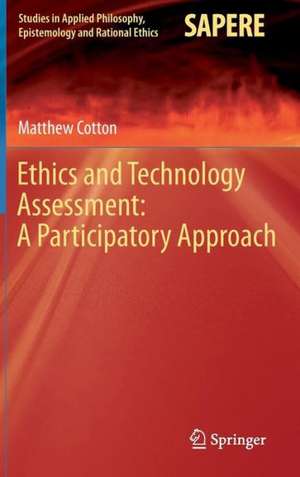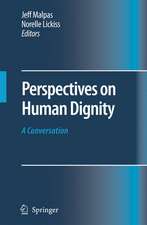Ethics and Technology Assessment: A Participatory Approach: Studies in Applied Philosophy, Epistemology and Rational Ethics, cartea 13
Autor Matthew Cottonen Limba Engleză Hardback – iul 2014
| Toate formatele și edițiile | Preț | Express |
|---|---|---|
| Paperback (1) | 357.56 lei 38-44 zile | |
| Springer Berlin, Heidelberg – 17 sep 2016 | 357.56 lei 38-44 zile | |
| Hardback (1) | 370.88 lei 38-44 zile | |
| Springer Berlin, Heidelberg – iul 2014 | 370.88 lei 38-44 zile |
Din seria Studies in Applied Philosophy, Epistemology and Rational Ethics
- 20%
 Preț: 603.90 lei
Preț: 603.90 lei -
 Preț: 397.59 lei
Preț: 397.59 lei -
 Preț: 359.54 lei
Preț: 359.54 lei - 20%
 Preț: 989.96 lei
Preț: 989.96 lei - 24%
 Preț: 787.50 lei
Preț: 787.50 lei -
 Preț: 390.08 lei
Preț: 390.08 lei - 15%
 Preț: 641.20 lei
Preț: 641.20 lei - 20%
 Preț: 991.60 lei
Preț: 991.60 lei - 20%
 Preț: 646.95 lei
Preț: 646.95 lei - 15%
 Preț: 653.98 lei
Preț: 653.98 lei -
 Preț: 384.48 lei
Preț: 384.48 lei -
 Preț: 395.47 lei
Preț: 395.47 lei - 18%
 Preț: 1216.95 lei
Preț: 1216.95 lei - 18%
 Preț: 947.50 lei
Preț: 947.50 lei -
 Preț: 388.72 lei
Preț: 388.72 lei -
 Preț: 390.08 lei
Preț: 390.08 lei -
 Preț: 395.09 lei
Preț: 395.09 lei -
 Preț: 394.12 lei
Preț: 394.12 lei - 15%
 Preț: 644.82 lei
Preț: 644.82 lei - 15%
 Preț: 698.15 lei
Preț: 698.15 lei - 18%
 Preț: 1840.91 lei
Preț: 1840.91 lei - 20%
 Preț: 656.84 lei
Preț: 656.84 lei -
 Preț: 389.70 lei
Preț: 389.70 lei - 20%
 Preț: 991.46 lei
Preț: 991.46 lei - 15%
 Preț: 585.73 lei
Preț: 585.73 lei - 15%
 Preț: 711.40 lei
Preț: 711.40 lei - 15%
 Preț: 589.33 lei
Preț: 589.33 lei - 15%
 Preț: 700.42 lei
Preț: 700.42 lei
Preț: 370.88 lei
Nou
Puncte Express: 556
Preț estimativ în valută:
70.96€ • 74.10$ • 58.60£
70.96€ • 74.10$ • 58.60£
Carte tipărită la comandă
Livrare economică 11-17 aprilie
Preluare comenzi: 021 569.72.76
Specificații
ISBN-13: 9783642450877
ISBN-10: 3642450873
Pagini: 184
Ilustrații: XII, 172 p. 8 illus.
Dimensiuni: 155 x 235 x 16 mm
Greutate: 0.44 kg
Ediția:2014
Editura: Springer Berlin, Heidelberg
Colecția Springer
Seria Studies in Applied Philosophy, Epistemology and Rational Ethics
Locul publicării:Berlin, Heidelberg, Germany
ISBN-10: 3642450873
Pagini: 184
Ilustrații: XII, 172 p. 8 illus.
Dimensiuni: 155 x 235 x 16 mm
Greutate: 0.44 kg
Ediția:2014
Editura: Springer Berlin, Heidelberg
Colecția Springer
Seria Studies in Applied Philosophy, Epistemology and Rational Ethics
Locul publicării:Berlin, Heidelberg, Germany
Public țintă
ResearchCuprins
Acknowledgements.- List of abbreviations.- Risk and public involvement in technology governance.- Ethics and technology.- Pragmatism, public deliberation and technology ethics.- Ethical tools.- Reflective Ethical Mapping.- Opening up ethical dialogue.- Judging and deciding.- Conclusions.
Textul de pe ultima copertă
Whether it is nuclear power, geo-engineering or genetically modified foods, the development of new technologies can be fraught with complex ethical challenges and political controversy which defy simple resolution. In the past two decades there has been a shift towards processes of Participatory Technology Assessment designed to build channels of two-way communication between technical specialists and non-expert citizens, and to incorporate multiple stakeholder perspectives in the governance of contentious technology programmes. This participatory turn has spurred a need for new tools and techniques to encourage group deliberation and capture public values, moral and choices. This book specifically examines the ethical dimensions of controversial technologies, and discusses how these can be evaluated in a philosophically robust manner when the ones doing the deliberating are not ethicists, legal or technical experts. Grounded in philosophical pragmatism and drawing upon empirical work in partnership with citizen-stakeholders, this book presents a model called “Reflective Ethical Mapping” - a new meta-ethical framework and toolbox of techniques to facilitate citizen engagement with technology ethics.
Caracteristici
Addresses the theory, methods and practice of participatory technology assessment (pTA) in relation to large-scale technological and environmental policies and programs Presents a practical and participatory decision procedure that facilitates the non-specialists' deliberations on the ethical aspects of controversial technologies Develops and discusses an ethical decision-support procedure termed “Reflective Ethical Mapping” (REM), and evaluates it in a practical context: radioactive waste management in nuclear communities
















